Effectiveness of Motivational Interview Program for Behavior Modification in Type 2 Diabetes Patients with Uncontrolled Blood Glucose at Sapandum Community Health Center, Sawan Pracharak Hospital
Keywords:
Motivation interview program, Behavior modification, Type 2 diabetes patientAbstract
This research is a quasi-experimental study employing a non-equivalent two-group pretest-posttest design. The purpose of the research was to study the effectiveness of a motivational interview program in changing the behavior of patients with type 2 diabetes who were unable to control their blood glucose levels. The sample consisted of type 2 diabetic patients who were unable to control their blood glucose levels at Saphan Dam Community Health Center, Sawan Pracharak Hospital, Nakornsawan Province. A total of 64 individuals were selected through stratified random sampling and assigned to either the experimental group (32 participants) or the control group (32 participants) using a matching method. The experimental group participated in the motivational interview program designed to change behavior whereas the control group was free of the intervention program. Data collection included a test form and a questionnaire. Data analysis was conducted using frequency, percentage, mean, standard deviation, paired sample’s t-test, and independent sample’s t-test. The research results showed that after the experiment, the experimental group demonstrated significant improvements in several areas compared to their pre-experiment levels and the control group. These areas included knowledge about diabetes, health beliefs about diabetes, self-management behaviors for controlling blood glucose levels, and hemoglobin A1C levels. These improvements were statistically significant at the 0.05 level.
References
เทอดศักดิ์ เดชคง. (2563). ผลของโปรแกรมการสนทนาแบบสร้างแรงจูงใจต่อการควบคุมระดับน้ำตาลสำหรับผู้ป่วยโรคเบาหวานชนิดที่ 2. วารสารสถาบันบำราศนราดูร, 14(3), 134-145.
เทอดศักดิ์ เดชคง. (2565). แนวปฏิบัติการสนทนาสร้างแรงจูงใจเพื่อปรับเปลี่ยนพฤติกรรมสุขภาพ. กรุงเทพฯ:บียอนด์พับลิสชิ่ง.
ธีรภาพ เสาทอง. (2563). ผลของการปรับเปลี่ยนพฤติกรรมต่อการควบคุมระดับน้ำตาลในเลือดของผู้ป่วยโรคเบาหวานชนิดที่ 2 ที่ไม่สามารถควบคุมระดับน้ำตาลในเลือดได้. วารสารวิจัยสุขภาพและการพยาบาล, 32(2), 19-32.
ยุวดี คาดีวี. (2566). ผลของโปรแกรมการสนทนาแบบสร้างแรงจูงใจต่อการควบคุมระดับน้ำตาลในเลือดในผู้ป่วยโรคเบาหวานชนิดที่ 2 โรงพยาบาลเขาวง จังหวัดกาฬสินธุ์. วารสารสุขภาพและสิ่งแวดล้อมศึกษา, 8(2), 390-398.
ระบบคลังข้อมูลสุขภาพ. (15 พฤศจิกายน 2566). ข้อมูลตอบสนอง Service Plan สาขาโรคไม่ติดต่อ. https://nsn.hdc.moph.go.th/hdc/.
วิชัย เอกพลากร. (2564). รายงานการสำรวจสุขภาพประชาชนไทยโดยการตรวจร่างกาย ครั้งที่ 6 พ.ศ. 2562-2563. กรุงเทพฯ: กราฟิคอาร์ต.
โรงพยาบาลสวรรค์ประชารักษ์. (2566). เอกสารสรุปผลการปฏิบัติงาน ประจำปีงบประมาณ พ.ศ. 2566. นครสวรรค์: ศูนย์แพทย์(ศูนย์สุขภาพชุมชนเมืองสะพานดำ) โรงพยาบาลสวรรค์ประชารักษ์.
อภิสรา ธำรงวรางกูร. (2566). ผลของโปรแกรมการสนทนาเพื่อสร้างแรงจูงใจแบบสั้นและการติดตามเยี่ยมบ้าน โดยทีมหมอครอบครัวในผู้ป่วยเบาหวานประเภท 2 ที่ควบคุมระดับน้ำตาลได้ไม่ดี. วารสารวิทยาลัยบัณฑิตเอเชีย, 13(1), 1-11.
Becker, M. N. & Maiman, L. A. (1978). Socialbehavioral determinants of compliance with health and medical care recommendations. Medical Care, 13(3), 10-14.
Bandura, A., & Wood, R.E. (1989). Effect of perceived controllability and performance standards on self-regulation of complex decision-making. Journal of Personality and Social Psychology, 56(2), 805-814.
Faul, F., Erdfelder, E., Buchner, A., & Lang, A. G.(2009). Statistical power analyses using G*Power 3.1: Tests for correlation and regression analyses. Behavior Research Methods, 41(4), 1149-1160. https://doi.org/10.3758/BRM.41.4.1149.
Glasgow, R. E., Davis, C. L., Funnell, M. M., & Beck, A. (2003). Implementing practical interventions to support chronic illness self-management. Joint Commission Journal on Quality and Safety, 29(11), 563-574.

Downloads
Published
How to Cite
Issue
Section
License

This work is licensed under a Creative Commons Attribution-NonCommercial-NoDerivatives 4.0 International License.



